Easter in Staines
Staines, Middx. Sun 31 Mar 2013
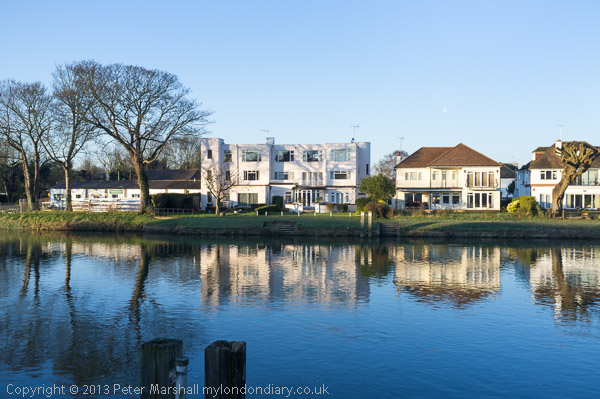
Early morning view before the dawn Easter service
more pictures
To be honest it was just a bit after dawn, as sunrise was at 6.37am, about the time I was getting out of bed, having not been there very long - the clocks had gone forward and so we'd lost an hour's sleep. I certainly wasn't feeling my best, and didn't greatly enjoy the Easter service facing the river, but we went on to have a good breakfast at the Baptist church in Hale St.
Later at lunch there was some scepticism when I said that the former start of one of Staines's several rivers was still visible from Church St, so we had to come back into Staines to take a look. The former town ditch Sweeps Ditch used to run from the River Colne just after it was joined by the Wyradisbury River, and ran between the lino factory and the back of the High St, then along beside Factory Path and go below the High St and then under the now missing railway curve between the Windsor and Reading lines before going under the Reading line and flowing south - after a bit along the back of our garden and eventually into the Thames. The town ditch was blocked when they built a one-way system around 30 years ago, but south of the railway Sweeps Ditch still flows - at least usually - but is now pumped up from the Thames in the Thames St car park and piped to its old route. Except when the pump stops working, as it did for much of last year. Spelthorne Council seemed to have given up on it, but local councillors gave money from their 'better neighbourhood grants" to get the pump repaired.
Having got that far we walked on beside the Wyradisbury River, then across
the Windsor line and out to join the Wyradisbury again on Moor Lane. The route
back across the field and under the bypass to the footpath to the Wraysbury
Rd was a bit muddy, with part of the field under water, but it wasn't a problem.
There are a number of ditches around there too, including the County Ditch,
but the area has been so disrupted by gravel extraction, the by-pass and the
M25 that it is hard to know what anything is. We kept on along the path beside
the bypass on the other side of Wraysbury Rd, crossing the Thames beside the
bypass and then scrambling down beside the bridge to join the Thames path
back into Staines and home.
more pictures
Let's Get Shirty Over Bedroom Tax
Trafalgar Square to Downing St, London. Sat 30 Mar 2013
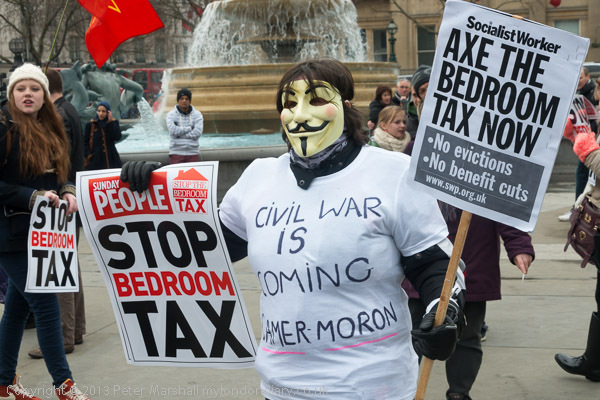
Civil War is Coming Camer-Moron was the message on one
'Anonymous' t-shirt
more pictures
Hundreds of protesters gathered in Trafalgar Square to show their opposition to the Bedroom Tax and other government measures against the poor; marching to Downing St, they sat down in Whitehall, some hanging shirts expressing their anger on the gates opposite.
'Let's Get Shirty' was the title given to the protest by groups around the country, with the thought that "the government are bleeding the people dry, what more do they want, well before they get the chance lets give them the shirts off of our backs." Some unable to attend in person have posted shirts with messages to Prime Minister David Cameron, who will be having an angry textile postbag over the next few days. Among those at the protest were many of the sick, disabled, poverty-stricken and out of work who will find themselves getting extra bills from April 1, cutting into their low pay and often inadequate benefits. There anger is increased by the knowing that while they are being hit by these cuts, the rich are benefiting from large tax cuts.
For many of them, "Can't Pay, Won't Pay" was more than a slogan, simply a fact of life. Many find themselves unable to pay the increased Council Tax contributions that are being demanded, and the Bedroom tax is a last straw. For many, if they are forced out of their homes because they are unable to pay for the 'extra rooms', there is simply no alternative social right size social property available, as for years housing associations have been encouraged to build two- and three-bedroom accommodation for all tenants. Their only alternative will be smaller privately owned flats, for which higher housing benefit is available, with the result of increasing the cost to the government and providing greater subsidy to private landlords.
Frank Field, who David Cameron appointed as a poverty advisor in 2010, has described the policy as "social and physical engineering on a scale that Stalin would have been proud of."
When I arrived in Trafalgar Square, Lee Jasper was entertaining a small crowd and getting them to sing with him a special Bedroom Tax version of the 1960 Lonnie Donegan UK #1 "My Old Man's a Dustman", who while still wearing his "cor blimey trousers" can of course no longer afford his council flat.
The protest, one of over 50 across the country promoted by 'Anonymous', had been organised on the internet, although some of the London group pages on Facebook appear to have been taken down, and on others some posts had been made suggesting it would not be happening here. Although numbers were not huge, there was no mistaking the anger and despair of many of those present, including one woman whose t-shirt read 'Civil War is Coming Camer-Moron'.
Seeing Jasper with a megaphone, police made the assumption that he was organising the event, and despite his protests persuaded him to get the protesters to line up and eventually set off to march to Downing St. The police were out in force, and had erected a wide double barrier along the side of the road in front of Downing St. When they arrived opposite this, most of the protesters broke away from the march and moved into the middle of Whitehall, where around 50 sat down and several hundred gathered around them, along with the press, with a line of police preventing them moving into the north-bound carriageway.
They stayed on the road for around an hour, with a group holding a meeting
and a number of people speaking at an open mike, before police decided to
slowly and firmly push them back onto the pavement. There was considerable
argument, but I saw no real violence. Most of the protesters had already gone
home by this time. A few who refused to move were left in the central area
between the roadways, and one who remained sitting in the actual road was,
after a short while, given the option of moving to sit with the others or
be arrested, and after a short deliberation he moved. A few minutes later
they all decided to move onto the pavement and I decided the protest had effectively
ended and went home. On the way I saw a few protesters who were arguing with
police outside the Houses of Parliament, but there didn't seem to be a lot
going on.
more pictures
Free Balochistan, Stop Dissapearances
Downing St, London. Sat 30 Mar 2013
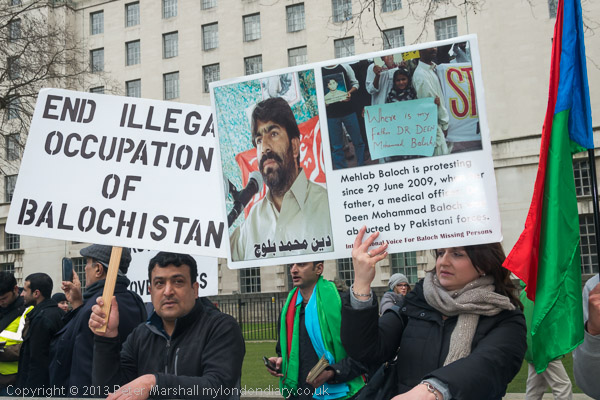
Many people have been kidnapped by Pakistani forces
and killed in Balochistan
more pictures
Protesters in London called for freedom for Balochistan, merged with Pakistan in 1948, and for an end to Pakistani death squads and disappearances of Balochs and persecution in Iran.
Balochs live in Balochistan, a province in the west of Pakistan and also across the border in Iran and in southern Afghanistan. When Pakistan was formed in 1947, the province retained some autonomy, but was soon more fully integrated into Pakistan. Baloch nationalists who rejected to King of Kalat's decision to join with Pakistan fought then with the Pakistan army but were defeated. They observe 27 March as a 'Black Day' to mark the occupation of the Eastern Part of Balochistan by Pakistan on 27 March 1948.
A separatist movement grew in the 1960s but was fiercely suppressed by Pakistan and Iran, re-energing in the 1990s, and insurgent groups are active in the area, including the Balochistan Liberation Army, which was listed as a proscribed terrorist group in the UK in 2006.
The Pakistani security forces have engaged in extrajudicial killings and in kidnapping of suspected militants, with an estimated 14,000 Balochs having disappeared in the last 10 years.
Many middle-class Balochs support the independence movement, and among those who have disappeared or known to have been killed are a number of doctors, some of whose pictures were on display at the protest. Another poster showed 120 portraits of men known to have been killed in Pakistani custody, and there was a grim image of the hanging of political activists in Iran.
This protest rally, which started at the Pakistani Embassy before coming to Downing St, was organised by the International Voice for Baloch Missing Persons, and among those taking part was Baloch patriotic leader Hyrbyair Marri, now living in the UK.
In Pakistan, protests and strikes were held on 27 March in almost all the
major cities of Balochistan, and several activists were injured when Pakistani
security forces attacked a rally in Quetta. The Pakistani army are also said
to have attacked a number of village, killing at least 17 people and abducting
at least 20 families. According to Baloch spokesmen, those abducted are usually
tortured and later killed and their bodies dumped in deserted areas.
more pictures
Release Political Prisoners in Bahrain
Downing St, London. Sat 30 Mar 2013
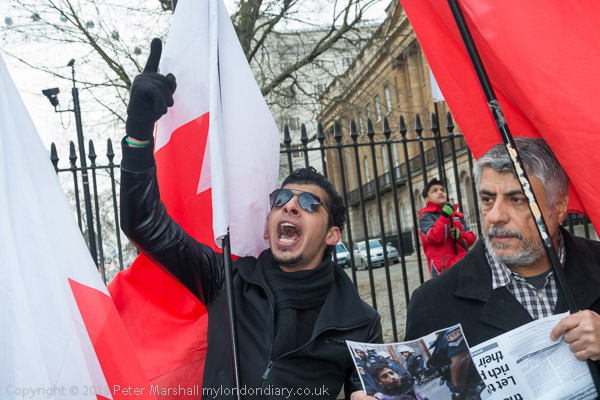
Protesters shout slogans from the Whitehall pen
more pictures
A small group of Bahrainis protested opposite Downing St about David
Cameron shaking hands with the 'butcher of Bahrain' King Hamad bin Isa Al
Khalifa, and called for the release of prisoners of conscience in Bahrain.
more pictures
Good Friday - Staines
Staines, Middx. Fri 29 Mar 2013
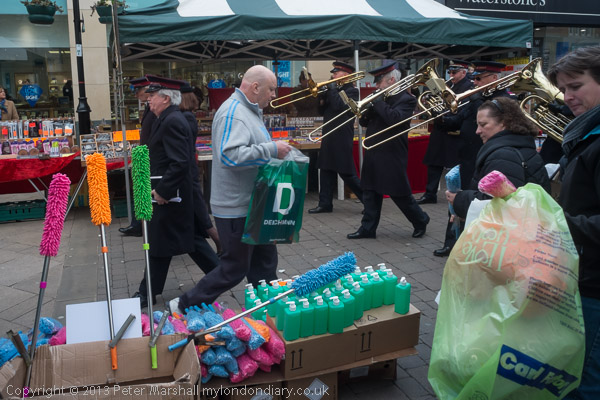
The Churches Together Good Friday Procession on its
way to an open-air service in the Two Rivers area.
more pictures
Churches Together in Staines gathered at the Methodist Church in Thames St and marched through the market in the High St and on into the Two Rivers retail site, where there was an open-air service, with the Salvation Army band and singers and preachers from the local churches, and large numbers of Hot Cross Buns were handed out free to shoppers.
It was also an opportunity for me to try out using the Fuji X-Pro1 and Fuji
X-E1 rather than my usual Nikons.
more pictures
Blood Diamonds at Sotheby's
New Bond Street, London. Wed 27 Mar 2013
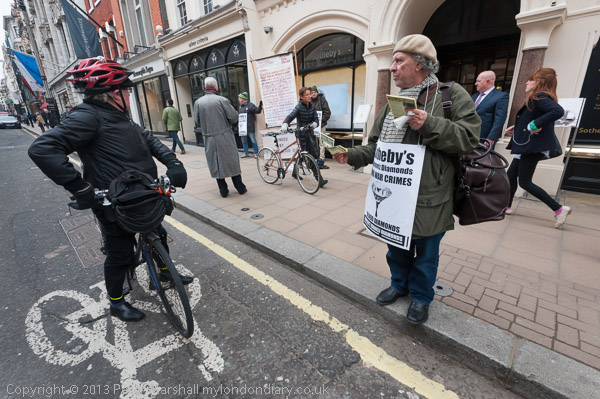
A passing cyclist stops his bicycle on a bicycle to read the placards at the
protest outside Sothebys
more pictures
Protesters stood outside Sotheby's Mayfair premises today, opposing their partnership with the Steinmetz Diamond Group which they allege launders illicit blood diamonds and sponsors the Israeli Givati Brigade accused of war crimes in Gaza.
The protesters allege that Israel imports relatively small amounts of legal rough diamonds but exports much more as cut and polished diamonds. The trade in rough diamonds is governed by the 'Kimberley Process' which prohibits the trade in rough diamonds from conflict areas, but does not apply to cut and polished diamonds. They allege that Israel imports illegal rough diamonds from war-torn countries such as the Congo, and cuts and polishes them so they can be legally sold.
Diamonds are Israel's largest manufacturing export, at $10 billion making up around 30% of the country's export trade, and according to Israeli economist Shir Hever, "the Israeli diamond industry contributes about $1 billion annually to the Israeli military and security industries."
Sotheby's have joined with the Steinmetz Diamond Group to form Sotheby's Diamonds. The Steinmetz company have a foundation which gives charitable donations to the Givati Brigade of the Israeli military which the UN Human Rights Council has accused of war crimes and possible crimes against humanity. During 'Operation Cast Lead', the invasion of the Gaza Strip, the foundation stated it "helped the unit buy complementary equipment" and visited and cared for the soldiers."
In that operation in January 2009 the Givati Brigade rounded up a hundred members of the Samouni family and ordered them into a house that was then bombed, and they prevented rescue workers from entering for four days, shooting at ambulances that tried to approach. When finally rescuers were allowed in they found 29 bodies under the rubble, along with live but traumatised children who had been buried with their dead relatives. On the walls there was racist graffiti in Hebrew reading 'The only good Arab is a dead Arab.'
The remaining members of the Samouni family have made a video appeal asking people in the UK not to buy Steinmetz diamonds, and at the protest there was a large banner with a letter from Helmi Saumoni on behalf of the family to the Queen and people of England asking them to refuse to accept the gift from De Beers of a diamond processed by the Steinmetz Diamond company because of their support for the Givati Brigade responsible for the massacre of their family. There were weekly protests when this "Steinmetz Forevermark Jubilee Pink 35.60-carat diamond, presented to mark Queen Elizabeth II's Diamond Jubilee was displayed at the Tower of London last June.
Today's picket was a well-ordered event, with a small group of people, including one man born in Jerusalem who can no longer live there, standing with placards and banners on the pavement of New Bond St outside the entrance to Sotheby's, while some tuneful songs about Gaza and Palestine were played. Most of those walking by looked with interest at the banner and accepted a leaflet about the protest, with a few stopping to ask questions. Staff from Sotheby's watched from the doorway, and one came out to photograph the protest.
The London protest was one of a number around the world against Israeli 'blood diamonds' in a campaign which has only recently begun, and was called at very short notice, organised by Innovative Minds, an Islamic group using the the internet to campaign on issues effecting the Muslim community throughout the world, who call for the boycott of companies supporting the Israeli occupation of Palestine.
Independent Midwives Need Insurance
Old Palace Yard, Westminster, London. Mon 25 Mar 2013
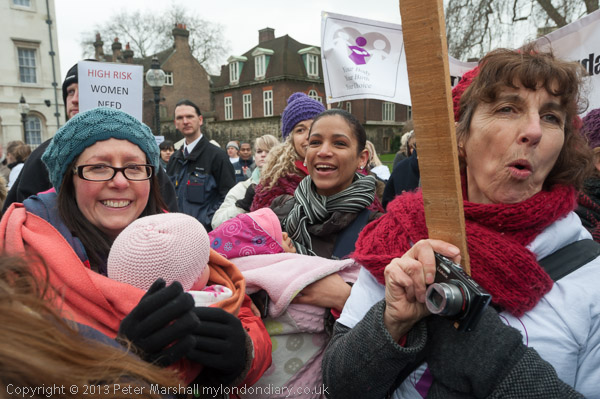
Mothers, independent midwives and supporters listen
to the speeches
more pictures
Independent Midwives, who offer women a continuous personal service throughout maternity, described by David Cameron as “gold standard” care, stood in a silent protest at Parliament against legislation that will make it impossible for them to work.
Current plans which will come into force on 25 Oct 2013 as a result of an EU directive on insurance and healthcare will make it impossible for independent midwives to practice as there are currently no provisions for them to obtain insurance.
Independent midwives offer woman-centred care with one-to-one support that is only available through a few NHS trusts. They are acknowledged to have vital and valuable skills that are fast being lost in many mainstream maternity units, where the only option women are offered for twins or breech babies is now normally caesarian section rather than a midwife-assisted vaginal delivery, and their practice has the effect of driving up the standards of mainstream maternity care.
There are apparently too few independent midwives for the insurance industry to be interested in providing the professional indemnity insurance (PII) required by the legislation, and independent midwives have been unable to obtain PII since 2002. Independent midwives are registered and regulated by the Nursing and Midwifery Council, and the services they provide
Even for the few midwives who currently work in the NHS and provide similar services there will be problems when they change jobs, and the extra services they now provide in the NHS may not be covered.
Independent midwives would like the NHS to allow them to deliver babies, particularly in more difficult cases, in hospital. Currently in many areas the NHS tells any women who say they want to give birth at home to use independent midwives, but denies these midwives access to NHS services. The NHS has an extreme shortage of midwives, which research has shown to be putting babies' lives at risk. The Royal College of Midwives has said 10,000 more are needed.
Over 250 women, many carrying small children, arrived on a near freezing morning for the protest, and as well as speeches from midwives and other professionals there were a number of mothers who gave testimony to the excellent level of service that is provided by independent midwives, including one who described herself as an 'ordinary mother' who had been dissatisfied by the local NHS provision, and said although she could not afford private care, had 'saved sixpences' by not buying chocolate, and although she still could not afford the full fee had found an independent midwife who was prepared to work with her and deliver her child. Like the other mothers who spoke, some who had had children normally while the NHS would have insisted on a Caesarian, or had been refused a home delivery on grounds of age, she was delighted with the level of personal care and support provided.
At the end of the protest opposite parliament, mothers and children posed
for a large group picture but there wasn't enough room to get them all in.
Some were going on to meet their MPs and lobby them, and a small group were
taking a large album with pictures of babies they had delivered and messages
from many of them to hand in at 10 Downing St for David Cameron. They were
accompanied to Downing St by most of the protesters, who continued their protest
opposite Downing St until the leaders came out.
more pictures
Barnet Spring - Save Local Democracy
Finchley Central - Friern Barnet, London. Sat 23 Mar 2013
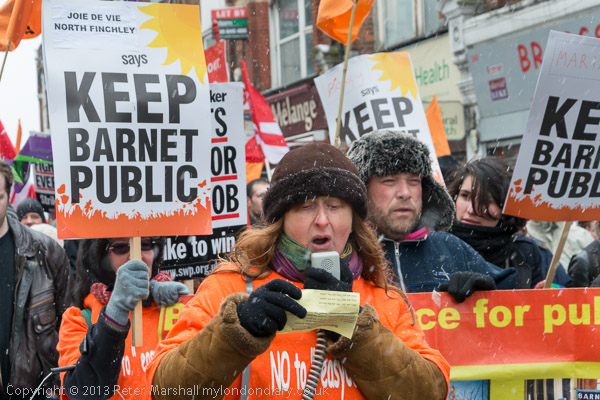
Marching into a small blizzard in North Finchley
more pictures
Several hundred marched through freezing snow in Finchley against the privatisation of local democracy in Barnet and against cuts in public services, to the Friern Barnet People's Library, already rescued determined by determined community action.
Barnet Council in North London is widely seen as a blueprint for Tory plans to end local democracy and privatise nearly all public services, leaving the local authority merely as a commissioning body. This is a development that ends real local involvement in running local affairs, locking councils into lengthy contracts which seldom meet local needs, but which councils are powerless to change and which often involve huge legal costs for the councils when disputes arise. One contractor has already successfully sued Barnet for over £10m when their contract failed to deliver the anticipated profits, and another, running services for adults with disabilities is failing financially and is drastically reducing the level of service it will provide.
The 'One Barnet' plans, known as "easyCouncil", were introduced in 2009 by the then CEO Nick Walkley, and were said by him to be based on the business practices of budget airlines such as easyJet and Ryanair. The contracts being negotiated with companies such as BT and Capita are worth around £1 billion. Last October Walkley left Barnet to take up a job as CEO of Labour controlled Haringey.
Despite a temperature of around zero and a weather forecast that predicted a day of wind chill, sleet and snow, people gathered for the march at Finchley Central station and stood and listened to a number of speakers from local community groups and others from across London. The protest was called by the Barnet Alliance for Public Services and had attracted a wide range of support from other local groups as well as trade unions and campaigning groups including DPAC, Whittington and Lewisham Hospital campaigns and Save Barnet NHS, Labour and Green party branches and others. Among the speakers before the march were Labour MPs John McDonnell and Jeremy Corbyn and Green Party Greater London Assembly member Jenny Jones AM.
The snow slackened off as the march started, but came on again heavily as it came to North Finchley, and I sheltered for a few minutes as the marchers struggled hardily on, at their head at coffin representing the death of democracy in what a poster described as the 'London Borough of Capita'. Fortunately it slackened slightly and I ran to catch up with them just before they reached the Friern Barnet Community Library where it was ending.
As well as cutting down on those attending the march, the appalling weather also meant there were fewer people out on the streets to see the march, but as it went past shops a number of people came to the windows or came outside to watch and show their support, with some coming out to contribute to the collecting buckets.
At the Friern Barnet Community Library there were hot drinks and food, and
also speeches. It was very crowded inside and felt very warm after the freezing
snow outside. There were a long list of speakers and then there was to be
music, but I had a small panic attack and had to leave in a hurry after the
first couple of speeches.
more pictures
Budget Day Protest against Cuts & Austerity
Kings College to Whitehall, London. Wed 20 Mar 2013
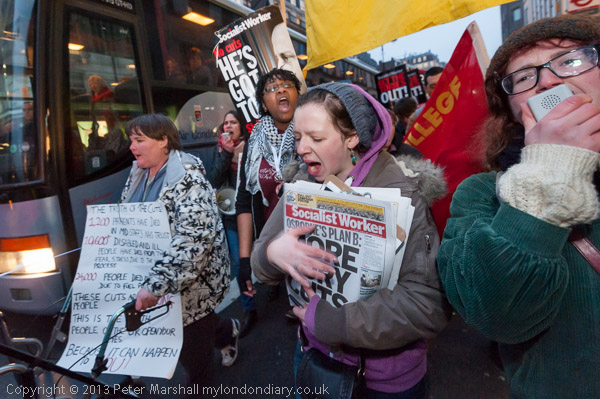
Protesters march along the Strand
more pictures
Budget Day protesters marched to a rally at Downing St, calling for an end to cuts and for a programme that would provide jobs and protect the poor rather than enrich the already wealthy, ditching Trident and stopping privatisation of the NHS.
The marchers gathered at King's College for the short march to a rally opposite Downing St. There were perhaps a couple of hundred people with a number of banners and placards, with a few more waiting for them on Whitehall, but they made quite an impression on the workers going home in the evening rush hour.
There were a number of speeches at Downing St, castigating the coalition government for its policies which have put the burden of paying for the recession largely onto the poorest groups in society, while giving out tax cuts to the rich, continuing the trend which has made this into one of the most unequal of developed societies. As one speaker said, the Tories saw the recession and the legacy of debt from the Labour government as a great opportunity to put into place the dismantling of the welfare state that had long been their goal, but which had been politically unacceptable - they could now blame it all on Labour.
Green MP Caroline Lucas, was among those who spoke, as well as those from
the groups that had organised the event, including Coalition of Resistance
and Unite the Resistance, the CND and one of the leaders of the Save Lewisham
Hospital campaign. Several mentioned the entirely pointless and wasteful expenditure
on Trident and its replacement, and we were invited to join the continuing
protests to save Lewisham hospital and the NHS. The speeches were continuing
as I left.
more pictures
Bring SOAS Cleaners In-house
School of Oriental and African Studies, London. Wed 20 Mar 2013
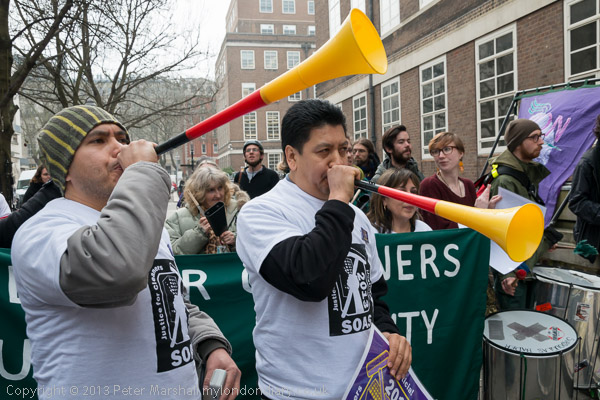
Cleaners make a noise at the rally outside SOAS
more pictures
In a protest at the School of Oriental and African Studies, students and staff backed the cleaners demand to be employed directly and so get the same conditions as other SOAS staff, to be treated with respect and paid the London living wage.
Because the people who clean the buildings at London's world-renowned School of Oriental and African Studies are employed through cleaning contractors ISS rather than by SOAS itself, they have working conditions and benefits far worse than those enjoyed by others working in the building. They want proper holidays, sick benefit and pensions like others who work there. Under the slogan 'One Workplace - One Workforce', students and teaching and other staff at SOAS are backing the cleaner's demands for the cleaning to be brought back 'in-house' - for them to be employed directly by the university.
The cleaners are also demanding to be paid at the London Living Wage - a level set annually by the Greater London Authority as the minimum needed to live in London, where the national minimum wage is clearly insufficient. Most reputable employers have accepted the need for the London Living Wage and have agreed to pay it to their employees, but many - such as SOAS - have been happy to cut costs by using contracted labour paid at below this rate.
Many of the cleaners are from Latin America, and one of the speakers at the rally was from Ecuador, and talked about that country's social policy, which has made this kind of cost-cutting outsourcing illegal. Although there is little prospect of this happening here, there was a strong feeling from the rally that it was an immoral practice, and one that - as other speakers including teaching staff and students made clear - went entirely against the principles and integrity of a respected institution like SOAS.
The cleaners campaign is supported by SOAS Unison and UCU unions, and also
by other unions who represent the cleaners elsewhere, and among those at the
protest was IWGB cleaner's leader Alberto Durango. Between speeches the protest
was a noisy one, with much blowing of horns and shouting of slogans, as well
as loud performances from the SOAS samba band. As well as the hour-long protest,
there were also giant letters which were to be presented to the management,
which were signed by many staff and students before and at the event as a
petition.
more pictures
PCS Strikers Boo Budget
Parliament Square & Old Palace Yard, London. Wed 20 Mar 2013
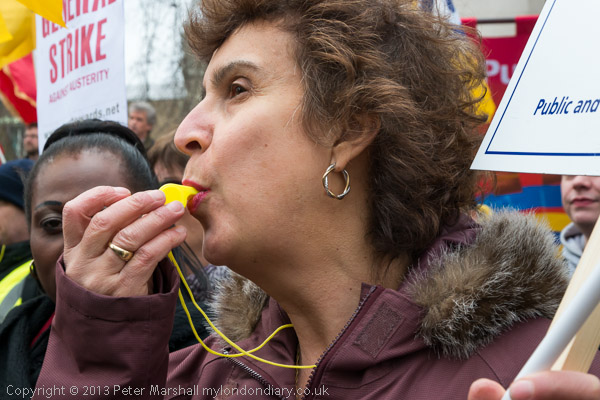
A PCS member blows the whistle on George Osborne's Budget
speech
more pictures
The PCS union held a one-day strike on Budget day in protest against the continuing attack by the government on public sector workers and working conditions with the programme of austerity that is wrecking the economy and hurting workers and those on benefits.
At the gates of Parliament I met a PCS picket, and standing with them were two Labour MPs, John McDonnell and Jeremy Corbyn, and I stopped to talk briefly and take a few pictures. Later I heard that the strike had had a direct effect on Parliament, closing down the canteen, with MPs having to make do with sandwiches.
Several hundred people were gathering for a rally opposite Parliament in Old Palace Yard, where the PCS had brought a giant TV screen which was showing Prime Minister's Questions when I arrived. It wasn't an edifying performance, and one which must contribute to the growing disillusion and scepticism about politicians. There was a particularly loud response from the crowd when one minister stood up to lie about the lack of any effect of the PCS one day strike - everyone present knew that he knew he was lying. Most present had been on the picket lines earlier and knew that many offices and facilities were closed or offering only a skeleton service staffed by a few managers.
The screen was there to enable the strikers to watch the budget speech online, but before George Osborne stood up there was time for a few speeches, with the main one coming from PCS General Secretary Mark Serwotka, who made it very clear that civil servants were not going to lie down and let the government flatten them. Several other speakers also spoke about the effect of government cuts on public services, the low paid and the disabled. There were disablement activists from DPAC (Disabled People Against Cuts) at the protest, and after speaking Serwotka went over to talk to them.
When Osborne finally came on screen, it was to loud boos and much heckling.
However well the budget went down elsewhere, it was a resounding failure to
the audience here.
more pictures
Chiswick & Hogarth
Chiswick, London. Tue 19 Mar 2013
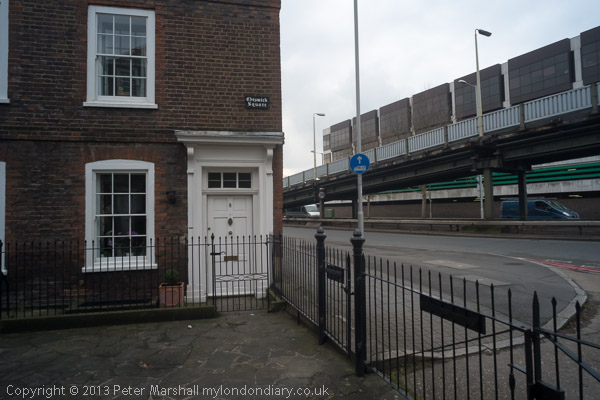
Chiswick Square and flyover at Hogarth roundabout
more pictures
Pictures from a short walk in Chiswick to a pub and then along to Hogarth's House, a small museum dedicated to Hogarth's life and work. And my first attempt at using a Fuji X Pro1 with various Leica and Voigtlander lenses. We walked a little along the Thames on our way and went back through the gardens of Chiswick House.
Hogarth bought his house as a country retreat from London, and a century
later it was on a narrow lane. Now it is a few yards from the busy Hogarth
roundabout. We ate in the George and Devonshire, one of two pubs close to
the Fuller's Griffin Brewery before going to the museum, which is now run
by the London Borough of Hounslow and entry is free. We'd meant to go to the
Mawsom Arms which is actually on the edge of the brewery site but didn't make
it that far, which was a pity.
more pictures
St Patrick's Parade Brent
Willesden Green, London. Sat 16 Mar 2013
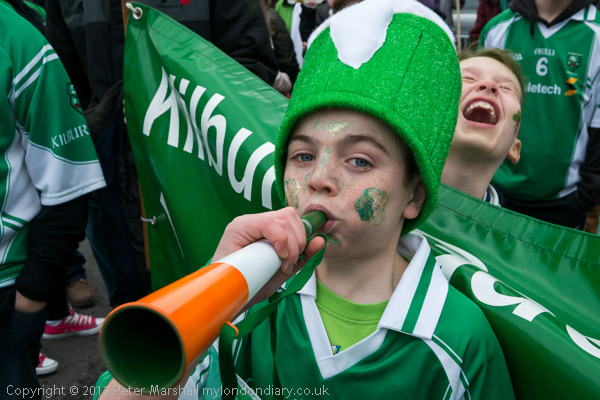
One of a lively group from Kilburn Gaels in the parade
more pictures
The annual St Patricks Day parade in Willesden Green, this year a day early,
was rather smaller than usual and the crowds were thinner, hit by the withdrawal
of council funding because of the cuts as well as the showery weather.
more pictures
Syria - Two Years Fight for Freedom
Syrian Embassy, Belgrave Sq, London. Sat 16 Mar 2013
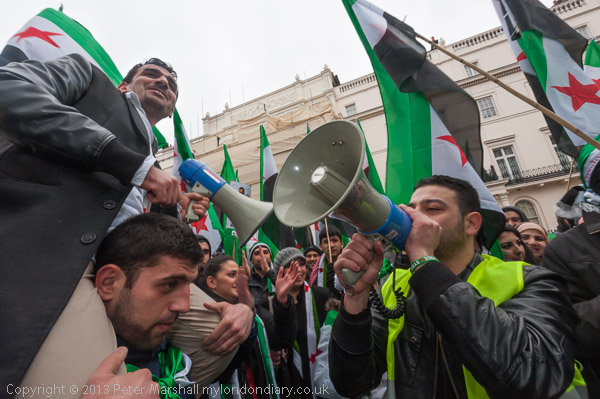
The rally opposite the Syrian Embassy before the march
to Downing St
more pictures
Syrians marched from the Syrian Embassy to Downing St on the second anniversary of the start of their fight for freedom to show their committment to the cause and their solidarity with fellow Syrians inside and outside Syria.
The event was organised by National Coalition for Syrian Revolutionary and Opposition Forces, and the UK Syrian community and as well as calling for Assad to go, they were also appealing to the international community to help them to get rid of him. One of the posters carried by marchers included the question 'Hey World, How Many Kids Should Be Killed Before You Do Something?'
When I arrived a group of perhaps a thousand were holding a noisy protest opposite the Syrian Embassy in Belgrave Square, many of them waving the Free Syrian flag. Others were wearing the flag draped around their shoulders, and a few had it painted on their faces. At the centre of the crowd were several people with megaphones, leading the protest in chanting about the crimes of the Assad regime and the need for him to go. Little or none of this was in English, although all of those I talked to spoke English. There were some posters and placards in English, but others in Arabic, but the images on them often made the meaning clear.
There was a fairly strong police presence in the area, and when the protesters formed up to march to a rally opposite Downing St there were police walking on both sides of the march. Although the event was entirely peaceful, and any trouble seemed unlikely, there have been some incidents at past events and the police were not taking chances.
The march looked impressive as it made its way under the Hyde Park underpass, fairly densely packed and with flags waving it spread wide across the road, stretching back into Wilton Place over 200 yards away. I left it at this point to go elsewhere
The Syrians stress proudly the contribution of their country to the history
of our civilisation and are appalled to see it laid waste by the attacks of
the Assad regime on the people and also on the ancient and beautiful cities
and towns. The brutal regime has so far killed over 70,000 people, injured
320,000, imprisoned 160,000, and caused several million to become refugees
inside and outside of Syria in its attempts to continue its 43 years of brutal
dictatorship.
more pictures
Whittington Hospital March Against Cuts
Highbury & Islington, London. Sat 16 Mar 2013
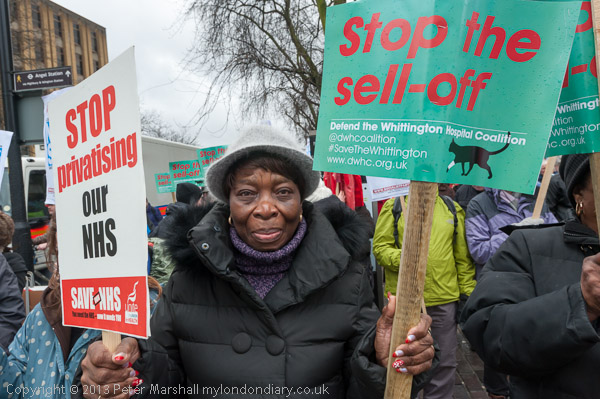
Protesters line up for the march to defend Whittington Hospital
more pictures
Supporters of Whittington Hospital, who fought a succesful campaign against closure of vital A&E and maternity services in 2010 were again on the march against new plans for cuts with seriously reduced services and selling off part of the site.
On a dull and wet Saturday, several thousand gathered at Highbury and Islington for the start of the march to a rally at Whittington Hospital to defend it against new plans for closures and serious reductions in the services as a part of the government's NHS reforms. Although David Cameron and the government stated that the NHS was "safe in their hands", the recently published regulations - even after they have been amended following a public outcry - seem designed to transfer as much as possible of the NHS from the public to the private sector, in which of many in the government and Conservative parties have a direct financial interest. The hands Cameron appears to have been referring to are those of the private companies that will increasingly run aspects of our health services.
In 2010, massive local opposition forced the cancellation of plans to get rid of the Accident and Emergency, Paediatrics, Maternity and Intensive Care services at the Whittington Hospital. The hospital is now being forced to apply for Foundation Trust status on an inadequate budget. The new trust plans to reduce maternity services, close wards, provide fewer beds for the elderly and to cut 570 job cuts. They will privatise some services and sell off around a third of the site and there will no longer be any onsite accommodation for nursing staff.
Foundation Trusts are separate business units, allowing them to be run by private companies rather than being a full part of a truly national health service. Privatising the provision of some services means that they may be delivered by less well-trained staff, usually underpaid and overworked and able to provide a lower standard of care.
There is already great pressure on hospital beds in the area, with 'red alerts' and occupancy rates at 94%, 10% above recommended levels. The area is already stretched and would be unable to deal adeqautely with a major emergency. Closing more beds will obviously increase the risk.
Rain was falling steadily as people began to gather for the march, and for a while it seemed as if numbers might be rather less than the organisers had hoped, but as the time for it to start approached more and more arrived, and the rain eased off. Among those marching were local MPs, Green Party Leader Natalie Bennett, Bruce Kent and various celebrity supporters of the campaign, as well as the truly remarkable Hetty Bower, born in 1905, who became a pacifist at the time of the 'Great War', and took part in the 1926 General Strike. The Whittington has been her hospital for many years - she remembers it before the NHS, and one of her daughters was born there in 1938. She marched all the way in 2010 and although now 107 was hoping to do so again today.
I left the march shortly after the start as it made its way towards a rally
outside the hospital where speakers were expected to include Owen Jones, author
of Chavs and Roger Lloyd Pack, Trigger from Only Fools and Horses, local MPs,
campaigners and people from the hospital and health unions.
more pictures
Jackie Nanyonjo Murdered by UKBA
Home Office, London. Thu 14 Mar 2013
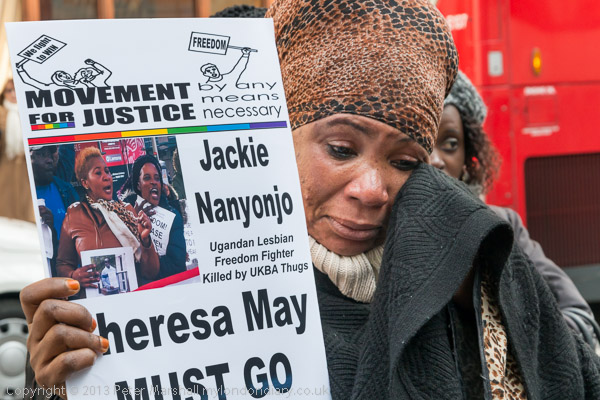
One of Jackie's friends cries as she listens to another
talking about her death at the hands of UKBA thugs
more pictures
Protesters at the Home Office claimed that Jackie Nanyonjo, a Ugandan lesbian forcibly deported to Entebbe in January who arrived vomiting blood after being violently restrained on the flight and died on 8 March was murdered by the UK Borders Agency.
Around a hundred people came to the lunchtime protest organised by the Movement for Justice (MFJ) with banners and placards and chanted slogans against the UK Border Agency (UKBA) and Home Office Minister Teresa May including:
'U. K. B. A - Racist, Sexist, Anti-Gay'
and
'U. K. B. A - Guilty of Murder'
Homosexual acts are illegal in Uganda, and punishable by up to 14 years in jail under laws which were inherited from the colonial past, but their Parliament in currently considering a strengthened Anti-Homosexuality Bill which includes provision for Ugandans who have gay sex outside Uganda to be extradited back to the country for punishment, for penalties for anyone who knows gay people or supports LGBT rights - and includes the possibility of the death penalty for homosexuals, although the international outcry this has caused may lead to this element being removed from the bill.
But apart from the legal position, gays in Uganda are at risk of being beaten up or raped, having their property vandalised, receiving death threats and being blackmailed in a rabidly anti-gay atmosphere. One prominent gay activist was murdered in Uganda in Jan 2011; previously he had been beaten up many times and his house was broken into; few (other than the UKBA) believe the Ugandan police reports that the motive for David Kato's murder was simply robbery.
Despite the many reports of persecution, the UKBA continue to deport gay asylum seekers to Uganda, including gay people who have left the country because of the persecution they have faced for being gay.
Jackie Nanyonjo came to the UK five years ago, having fled Uganda after being beaten and tortured by her husband following a forced marriage when he found that she was a lesbian. Here in the UK she was able to live openly as a lesbian, and took part in campaigns for gay rights and asylum rights with the Movement for Justice in this country. But despite evidence of her sexuality from her partner here and others in the LGBT community, the UKBA refused to believe she was a lesbian and turned down her application for asylum. They sent her to be detained in Yarl's Wood.
The first attempt to deport her was in December, during which she resisted and was brutally attacked by the security 'escorts' supplied by contractor Reliance used by the UKBA, and had to be returned to Yarl's Wood when the airline refused to carry her. She made a formal complaint to the UKBA against the brutal treatment by Reliance employees, but this was rejected. The only medical treatment she was able to get for the injuries she had sustained was paracetamol.
On Jan 10th the UKBA told her she was to be deported on an EgyptAir flight, despite having applied for a Judicial Review of her case. When the airline were told she was being deported against her will, they refused to carry her, but Qatar Airways agreed with the UKBA to fly her to Entebbe.
She was accompanied on the flight by 4 hefty security escorts from Reliance who, according to the account given at the protest by one of her close friends, beat her through the flight and forced her head down between her legs, and tried to strangle her. By the time she left the plane she was vomiting blood from the injuries she had received, but was not given medical attention.
When she was released to family members many hours later they rushed her to a clinic, but as the MFJ state, Uganda is "a country with widespread poverty and limited medical facilities (and) they were unable to get the medical attention Jackie needed."
The MFJ statement continued "Since Jackie was in hiding as a known lesbian, protected by relatives, every trip to a doctor or hospital involved a risk to her life and to the safety of her family. They were condemned to watch the agonising decline of Jackie’s health and strength over the next two months."
The protest was described as a trial of the UKBA and the Home Office for
the murder of Jackie Nanyonjo, and their turning of a blind eye to the activities
of their contractors. The MFJ say that "the real guilt lies with
the politicians and bureaucrats who run the Home Office and the UKBA, and
ultimately with the Coalition Government. Jackie Nanyonjo was a victim of
the immigrant bashing policies of Theresa May, the racist Home Secretary."
more pictures
Canary Wharf
Canary Wharf, London. Mon 11 Mar 2013
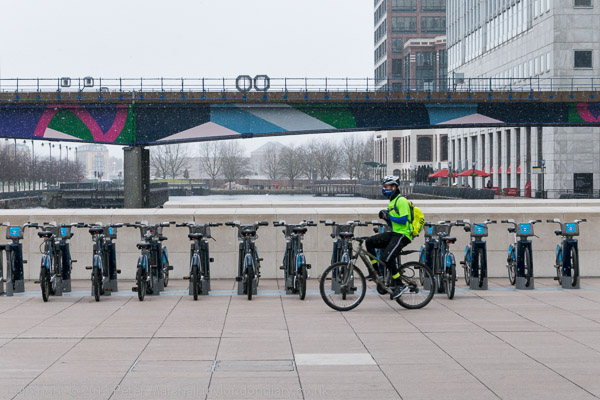
Cyclist at Canary Wharf doesn't seem bothered by the
snow.
more pictures
I would have stayed home but I'd agreed to give a talk at the Museum of London in Docklands so had to go out despite the freezing weather and the forecast of snow.
I'd allowed myself plenty of time to get there and arrived around half an hour before I'd intended - the TfL journey planner as usual being rather pessimistic about the time to change trains or walk anywhere. So despite the fact it was snowing I decided to take a little walk and a few pictures before arriving at my destination.
The snow was very fine, and hardly shows in most of the pictures, which was
disappointing, but it was often enough to really cut down visibility, and
certainly a bit of a nuisance blowing onto the lens. I wandered down towards
the riverside where it is very open and the wind was really rather strong
- I found myself clinging to a hand rail to keep still when I was taking pictures.
I was pleased to get inside the museum and still had time for a coffee before
my talk. It tasted all the better after the walk, but it probably is better
than the chains in any case. The museum is worth a visit too if you are in
the area, and it's free. I find I have a picture in a show 'Estuary' that
opens there in May - more about that later.
more pictures
Million Women Rise
Oxford St to Trafalgar Square, London. Sat 9 Mar 2013
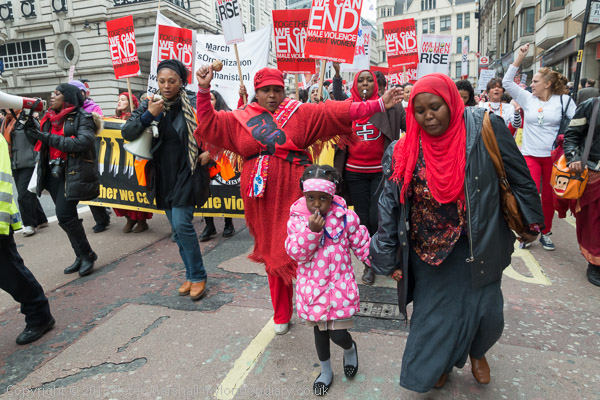
Women dance in front of the main banner as the march
goes down Haymarket
more pictures
Women marched to demand an end to male violence against women, calling for an active strategy of prevention of violence, provision of quality women-only support services and appropriate and effective legal protection for women and children.
Several thousand women gathered in London's main shopping street, Oxford St, for the start of the march, which began as a part of the international Million Women Rise movement. Among them were women from around the country and there was a strong representation of the different national and ethnic groups, with large Turkish, Kurdish, Asian and African groups.
The march is against all forms of violence against women, from domestic violence to the violence of war, and there were women from the Congo, Dafur, Sri Lanka and probably elsewhere protesting against the atrocities committed in the wars there, as well as those protesting about countries where women are oppressed for their political opposition such as Iran. The protest web site stated: "And we will not ignore the ongoing rape and genocide of our sisters and children across the world from Easten Congo to Iraq, Iran, Egypt, Palestine, Ivory Coast, Mali, Pakistan, Bangladesh, London, Bradford, Bolivia, Brazil, from Tamil women to Wales, East Europe, western Europe to the Americas to name a few."
Many of those taking part had heeded the encouragement of the organisers to "WEAR RED ... it symbolizes the colour of Woman and her blood, the blood of our sisters who have been murdered and raped , our blood which contains life, courage, respect, dignity and protection" and some had splashes of red paint on their faces.
Million Women Rise has a statement of demands that it welcomes those taking part to support which asks:
"the Government and societies, both at home and internationally:
- To acknowledge the continued discrimination faced by all women, the additional discrimination faced by Black women and women from other minority groups, and reflect this in all public policy in the UK and internationally
- For the adoption of a broad definition of violence against women, which makes the links between domestic abuse, rape and commercial sexual exploitation
- To pledge support and resources to the women’s not-for-profit sector which is at the forefront of supporting survivors of discrimination, abuse and violence. Women’s services are essential to a woman’s healing and empowerment
- To support the demands of the End Violence Against Women Coalition (EVAW) and End Child Prostitution, Child Pornography and Trafficking of Children for Sexual Purposes International Forum (ECPAT) for the protection of children and to adopt a cross government strategy addressing all forms of violence against women
- To abolish the ‘no recourse’ requirement for abused women who have insecure immigration status
- For all trafficked women and children to have a guaranteed minimum reflection period, specialist support and medical assistance, specialist safe houses for child and adult victims of trafficking and the right to a temporary residence permit if deemed at risk
- To commit to changing public attitudes and behavior towards women and girls through education initiatives and public awareness campaigns as set out by school programs such as Womankind Worldwide initiatives
- To hold the media accountable for the continued misrepresentation, misappropriation and abuse of the female body throughout all forms of media
- To recognise that global war and conflict perpetuates violence against women and to stop all wars now. Three out of four fatalities of war are women and children
- For International Women’s Day to become a National Bank Holiday in the UK and Ireland in recognition of and to celebrate women’s achievements
The prevention of violence against women and children is a cultural, social and political issue and must be a priority for all levels of Government. Action for a national strategy to oppose men’s violence is the responsibility of all political parties and must encompass:
- PREVENTION: Active prevention of violence against women and children.
- PROVISION: Adequate provision of quality women-only support services for women and children.
- PROTECTION: Appropriate and effective legal protection for women and children."
I left the march as it entered Trafalgar Square for a final rally there.
more pictures
Fukushima 2nd Anniversary
Hyde Park Corner, London. Sat 9 Mar 2013
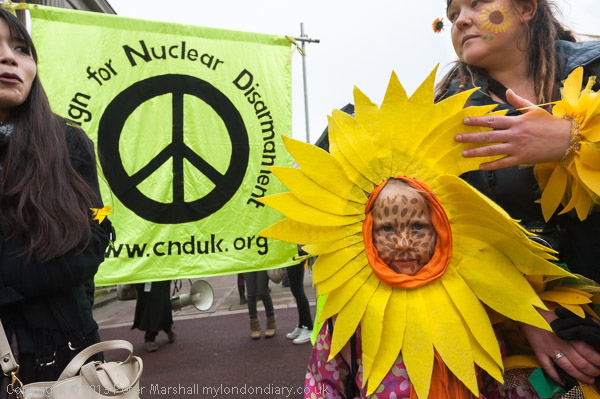
A young sunflower in the line up to start the march
more pictures
Japanese expatriates who hold protests against nuclear power every Friday at the Japanese Embassy following the Fukushima catastrophe led a march through London to mark the second anniversary of the disaster, supported by Kick Nuclear and CND.
Several hundred turned up for the march to mark the second anniversary of the Fukushima disaster which was organised by 'Japanese Against Nuclear UK' together with 'Kick Nuclear' and CND. Some had brought sunflowers, a symbol of renewable clean energy, particularly solar energy. There were several banners with the smiley sun symbol and the message 'Nuclear Power? No Thanks' and a group of people encased in fluorescent yellow barrels with a radioactive danger symbol and labelled 'Radioactive Waste.' Japanese protesters had brought a number of Japanese masks used to hid faces at protests in Japan against Fukushima, although many preferred to have sunflowers painted on their faces.
Among the protesters were a coachload from the west country opposed to the plans by EDF to build a new power station at Hinkley Point, and a man who has been seen in news videos recently protesting at the Huhne and Pryce trials, where he has enraged some photographers by standing with his placards behind the two defendants - and has been assaulted for doing so.
As the protest set off, police raised problems about the route and the safety
of the protesters, I had to leave before the march actually started. The protesters
were all ready in line on the pavement, although lined up to go in the opposite
direction to the planned route. They intended to march to make brief protests
at several locations including the Japanese embassy, the EDF office and Downing
St before ending with a rally and final protest opposite Parliament in Old
Palace Yard.
more pictures
Capgemini Cleaners Demand Living Wage
Vauxhall, London. Wed 6 Mar 2013
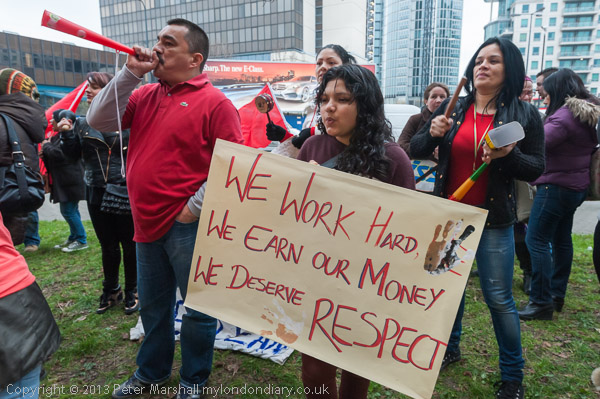
The cleaners kept up a noisy protest outside the offices
more pictures
Capgemini UK describes itself as an "Implementation-focused management consulting and Information Technology services group" and has large offices in a distinctive curved office block at Vauxhall, a mile or so upriver from Westminster. Although it offers outsourcing services covering IT, it outsources cleaning of its Vauxhall offices to another multinational contractor, ISS, "one of the world’s largest facility services providers."
ISS says its cleaners at Vauxhall don't work hard enough and want to make some of them redundant in the interests of "efficiency." The cleaners, all of them members of the IWGB (Industrial Workers of Great Britain) say that their shifts are only just long enough to complete the work asked of them, and made their views clear through their IWGB union representatives. ISS's response has been to ban the cleaners union reps from representing their members at a consultation meeting, and to try to get the cleaners to leave the IWGB and join a union that would be more compliant to the management demands.
The cleaners also complain of racist slurs, with an ISS senior manager allegedly telling them "you are not British, and you will never be British because you are not my colour". The cleaners union officials are adamant that they will not negotiate with the racist managers and that they must be replaced.
Although ISS has an annual revenue of £77 billion and had record profits last year, the cleaners are paid at the minimum possible legal level of £6.19 per hour, widely acknowledged to be insufficient to live on in London. They are demanding the London Living Wage, calculated annually by the Greater London Authority (GLA). Boris Johnson announced the current rate of £8.55 per hour in January.
The cleaners struggle is a struggle for fair and decent treatment by their employers, a struggle for justice. As they say, "We are not the dirt we clean!"
Capgemini had circulated workers in the offices about the protest, saying they expected it to be small. I found over 50 protesters gathered in Vauxhall bus station getting ready for the protest, and by the time it was under way there were close to a hundred. And the noise they were making with drums, plastic horns, various cans and whistles was pretty deafening, only lessening when they chanted slogans or listened to a number of short speeches.
Among the protesters supporting the cleaners from Capgemini were cleaners from other sites in London who are also campaigning for a living wage, including the Barbican and the Tower of London. A trade unionist from the RMT came to bring solidarity from the Underground cleaners on the Piccadilly, Northern and Jubilee lines, and there were some other messages of support from trade unions. Many of those taking part in the protest spoke, at least briefly, mainly in Spanish.
The protest was a peaceful one, and the security and other staff at Capgemini watched from inside the foyer; a couple of police officers drove up after around an hour, talked with those inside and then left.
The noisy protest continued for almost two hours, during which a number of people entered and left the offices. Unlike at many protests, almost all of those coming in or out took the flyers that were being handed out by the protesters.
A small group arrived at the protest with placards one of which read 'Chavez
Lives Forever'. Many of the cleaners are from South America and quite a few
were intending to go on from the protest to the Venuzuelan embassy.
more pictures
Vauxhall Images
Vauxhall, London. Wed 6 Mar 2013
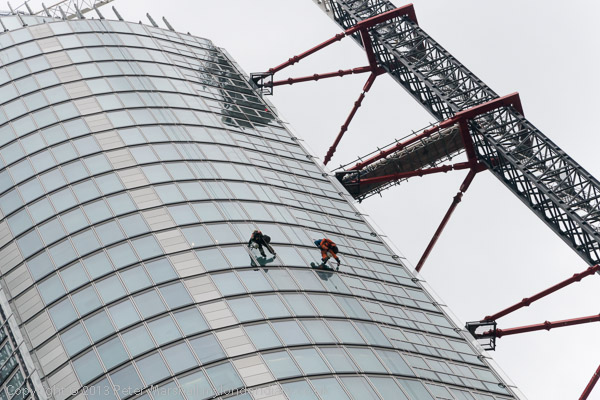
men at work high above my head on the St George Wharf
tower
more pictures
I arrived at Vauxhall a few minutes before the cleaner's protest began and made a few pictures a short distance away on the riverside path and looking at the towering cylindrical block being built there. I made a panorama in the same location as one I had made a few years ago, although the weather wasn't particularly suitable.
There were men working on the outside of the tower, high above the road,
and although I'm sure they were safely roped it looked dangerous. But there
is probably one possible danger less now, following the recent helicopter
crash into one of the cranes on this building, helicopters probably now give
it a wide berth.
more pictures
Against Back-Door NHS Privatisation
College Green, Westminster. Tue 5 Mar 2013
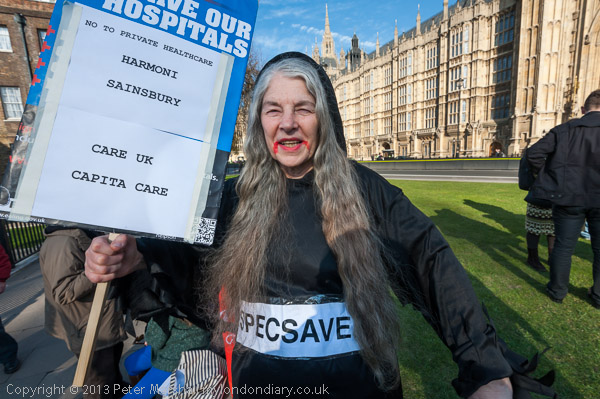
A vampire from Ealing where they performed a mock funeral
of the NHS in a protest against hospital closures
more pictures
Protesters outside the House of Lords claimed that secondary legislation regulations under Section 75 of the Health and Social Care Act will force the back door privatisation of the NHS, contradicting all previous government assurances.
The government had hoped that the regulations, which do not have to be debated and would open up virtually all NHS services to privatisation, would pass without notice. Although campaigners and MPs had begun to raise the issues around them over a week ago, for several days until forced by complaints the BBC appeared to be colluding with them in ignoring the issue.
When the act was passed last year, assurances were given by ministers during the passage of the Bill through Parliament that it did not mean the privatisation of the NHS, with minister Andrew Lansley saying in Parliament "There is absolutely nothing in the Bill that promotes or permits the transfer of NHS activities to the private sector." In contradiction, the regulations published force almost all activities to be open to competition.
The lunchtime rally opposite the House of Lords began with an unexpected moment of farce when Tory MP for Canterbury and Transport Minister Julian Brazier perhaps showed the true face of the Conservative Party. On his way to a TV interview he stopped briefly to to argue with a health activist, defending the cuts and the attempt to enforce competition, labelling the NHS as a 'Stalinist system.'
He was the first of a number of MPs to speak at the rally, although all the rest made rather more sense. Mike Gapes, MP for Ilford South and Andy Slaughter, MP for Hammersmith both gave us some details of the proceedings inside the House of Commons minutes earlier when the Shadow Secretary of State for Health, Andy Burnham, had asked an urgent question on the NHS Commissioning Board and the National Health Service (Procurement, Patient Choice and Competition) Regulations.
Minister Jeremy Hunt, perhaps expediently, had decided to stay away from the House, and had sent Lib Dem Minister of State Norman Lamb "to the slaughter" in his place (It was reported that Burnham described Hunt's action as "cowardly.") Lamb's response was that the regulations had never been meant to mean what they all too clearly say, and he conceded that they would have to look at them again.
Slaughter had followed up by asking that there should be proper safeguards against those in the clinical commissioning groups who make the decisions having a financial interest in the bids that were made. He got the reply from the Minister that this was already covered with those involved completing a form stating any shares they held in the companies. Slaughter commented to the rally that this was not an acceptable safeguard against dishonest and that such forms were often simply not completed.
He repeated the view held by many that the major driving force behind the current Health service reforms is greed - with many in government and business, as well as some doctors rubbing their hands at the thought of the rich pickings that the privatisation will provide.
Another MP who got a great reception was Caroline Lucas of the Green Party, who was the first MP to take action over the privatisation regulations, tabling a 'prayer' that the regulations be annulled on Feb 25th, which brought them to the attention of many other MPs.
Other MPs who spoke at the rally included Steve Pound, MP for Ealing North and Virendra Sharma, MP for Ealing, Southall. Later Julian Bell, the Leader of Ealing Council also spoke, reminding us that four hospitals in Ealing, one of the most densely populated areas in West London, are due to lose emergency and other services, essentially meaning their closure. Ealing Council have just decided unanimously to take their case to judicial review and to refer it back to Secretary of State Jeremy Hunt.
One woman who spoke told of her experience as a patient taken into Ealing Hospital with a suspected stroke. She had to be 'blue-lighted' to Northwick Park for specialised tests, and it took 38 minutes to get her there - while the report on which closure and transfer of A&E there is recommended states it is only a 12 minute journey.
Several medical staff and activists also spoke, and one stressed how the privatisation and commissioning processes were taking up much of the time of medical staff and preventing them from getting on with the job of treating patients. Although some speakers suggested the trade unions had not yet taken the campaign to save the NHS sufficiently to heart, one of the speakers was Phil Rose, recently appointed by Unite the Union to campaign on health issues.
Among those attending the rally, some had brought banners and placards from the various campaigns around London, but the presence of a campaigner from Yorkshire stressed that this was a national problem and a national campaign. As well as placards there were two street theatre activists who took part in a 'Funeral of the NHS' as a part of the campaign to save Ealing Hospital.
Pressure on this issue, in and out of the house has caught out those who
thought they could get away with privatisation, but it remains to be seen
what changes will be made to the regulations. And there seems little doubt
that whenever we next have a Tory government the NHS is doomed to become a
health for private profit enterprise.
more pictures
Reading to Aldermaston Walk
Sat 2 Mar 2013
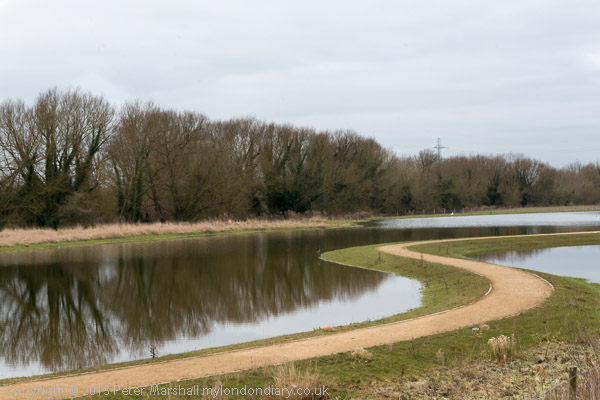 A
recently established nature reserve - we kept to the towpath rather than take
the winding route
A
recently established nature reserve - we kept to the towpath rather than take
the winding route
more pictures
I'd walked from Reading to Aldermaston before in 2004 in the company of well over 2000 other people, and have cycled there to photograph protests around our nuclear weapons factory, but I've not walked the route along the Kennet Navigation, although some of the first photographs I developed myself were made beside it in Reading. But that was before much of the navigation and the canal had been restored and most of the more interesting buildings beside it knocked down, though my pictures weren't much.
We joined the navigation more or less at County lock in Reading and walked along the footpath beside it (or the river, which sometimes diverge) until we reached Aldermaston where we took a train home. My wife and son had tried to walk this earlier in the year but the towpath was flooded and they had to abandon and walk elsewhere. We had no such problems. Around halfway we stopped at the only pub actually on the river, the Cunning Man (an 'antique pub' built in 2001but the beer is ok) for a short drink, and ate our sandwiches a little further on at Garston lock, one of the few turf-sided locks remaining.
Eventually we got to Aldermaston Wharf - the nuclear weapons establishment
is a mile or two up the hill and we didn't pay it a visit. There wasn't a
great deal to do as we waited around 40 minutes for the hourly train, though
we did see the second moving boat of the day (except for a few canoes), just
hired from the wharf and being shown how to work the lock.
more pictures
Tortured to Death in Israeli G4S Prison
Victoria St, Westminster, London. Fri 1 Mar 2013
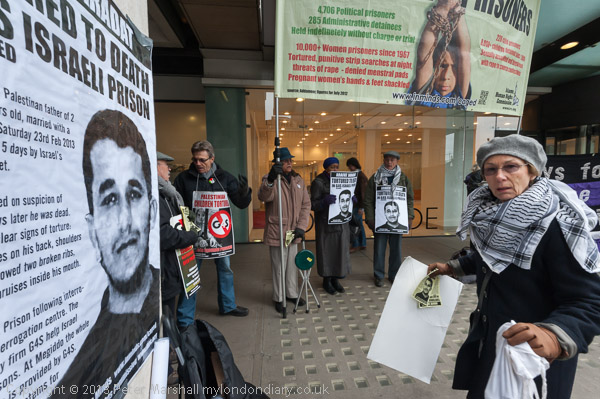
Arafat Jaradat on poster at left died after 5 days of
torture in Israeli prisons run by G4S
more pictures
Activists protested outside the Westminster HQ of G4S which provides security services to the Israeli prison and interrogation centre where Palestinian Arafat Jaradat died after being tortured last week.
Palestinian Arafat Jaradat, a 30 year-old married man with two children and whose wife is expecting a third was arrested on suspicion of having thrown a stone. After 5 days of torture by Israel security service Shin Bet he died in Megiddo Prison from his injuries. Both this prison and the interrogation centre where he was tortured rely on security services from the UK-Danish company G4S.
Private security firm G4S is best-known in this country for their failure to provide security for the Olympics, but also responsible for some of our prisons and detention centres. It was G4S security guards who were responsible for the death of Angolan detained refugee Jimmy Mubenga during a forced deportation flight.
In Israel, G4S also provided the security systems for the Ofer prison where children have been sexually assaulted by Israeli interrogators and the al Jalame interrogation centre where children have been locked in small solitary confinement cells for as long as 65 days, as well as shackled to a chair and abused in the interrogation room.
Israel claims that Jaradat died from a cardiac arrest, but his post-mortem showed clear evidence of torture, "beating on chest, lashes on his back, shoulders near spine. Autopsy showed two broken ribs, blood in his nose and bruises inside his mouth."
Richard Falk, Professor Emeritus of International Law, Princeton University and UN Special Rapporteur on Human Rights in the Palestinian Territories stated "The death of a prisoner during interrogation is always a cause for concern, but in this case, when Israel has shown a pattern and practice of prisoner abuse, the need for outside, credible investigation is more urgent than ever," and US Middle East envoy Robert Serry has also called for an independent enquiry.
Most of the 4,500 Palestinians held in Israeli prisons have never been charged or tried. They include 4 prisoners who have been on hunger strike for months.
Protesters were outside the UK head office of G4S in Westminster this afternoon
in a protest organised by Innovative Minds and the Islamic Human
Rights Commission, holding up several banners including a large one calling
for the freeing of all Palestinian prisoners. A second banner was for 'Jews
for Justice for Palestinians'. Others held posters with a photograph
of Jaradat and the message 'Arafat Jaradat - Tortured to Death in G4S
Secured Israeli Prison' and other posters about the complicity of G4S
in the Israeli prison system. Scattered across the wide pavement were people
busily giving out leaflets with information about both the death of Jaradat
and the complicity of G4S in torture of Palestinian children.
more pictures
Innisfree PFI Bankrupts NHS
Gutter Lane, City of London, Fri 1 Mar 2013
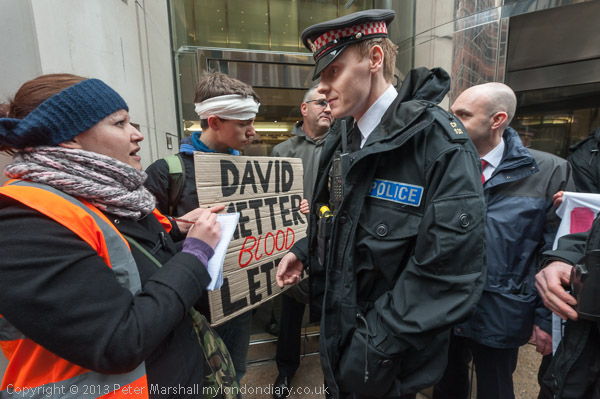 A
legal observer questions police who are telling a protester he must move from
the doorway or be arrested
A
legal observer questions police who are telling a protester he must move from
the doorway or be arrested
more pictures
Supporters of the NHS protested outside the offices of Innisfree, one of 3 companies whose prohibitive PFI deal under Labour is leading to the forced closure of A&E and other facilities at Lewisham Hospital and to privatisation of the NHS.
PFI contracts set up under the Labour government were poorly thought and agreed by inexperienced negotiators on the government side, with the result that they are now cripplilng various areas of our public finacnces - including schools, hospitals, transport, prisons and courts and even the Ministry of Defence.
As well as paying excessive interest rates, the deals also locked hospitals into expensive maintenance and service contracts which involve payments at well above market rates - one hospital was charged £300 to change a light bulb.
A PFI deal with a consortium of three companies - Barclays Private Equity, Taylor Woodrow and Innisfree - built new hospitals for South East London at Woolwich and Farnborough. The cost of the buildings was £210m, and the NHS has already paid back around two and a half times this amount; by the end of the contract in 2032 the total payment will be around 12 times the original amount at £2500m.
Mathew Kershaw, the Trust Special Administrator was appointed to sort out the finances of the South London Healthcare NHS Trust (SLHT) which covers hospitals in the London Boroughs of Bexley, Bromley and Greenwich bankrupted by the need to find huge amounts - £60m this year- for this PFI repayment. Lewisham Hospital in a neighbouring area is run succesfully by the separate Lewisham Healthcare NHS Trust.
Kershaw was unable to find a solution within the SLHT, mainly because of the PFI contracts involved. So he recommended that the SLHT should be dissolved by 1 Oct 2013 and the three hospitals - including those at Woolwich and Farnborough along with Sidcup - be taken over by neighbouring trusts - with a new merged Lewisham-Greenwich provider responsible for hospitals in Lewisham and Woolwich.
Lewisham Hospital is run by the separate Lewisham Healthcare NHS Trust which does not share the problems of the SLHT. By deciding to change the boundaries to include it with Greenwich, Kershaw as a part of his solution was able to recommend to the Minister the closure of Lewisham hospital A&E, Maternity and some other services and the Minister has accepted his recommendation. Lewisham is not covered by a PFI contract and is thus easier to cut, and is being sacrificed as a part of the solution to the financial problems of the SLHT although it was not a part of it.
Lewisham is a successful hospital - thanks in part to recent investements, and is well run, operating within budget and providing a high standard of care. Closure of services involves considerable costs, and these services will need to be provided at other hospitals, probably at higher cost. The closure will not achieve savings, but will waste the previous investment that has been made in the hospital - it is simply a book-keeping exercise.
Around 30 people gathered this morning on the steps of St Paul's Cathedral were there was a short rally with speeches about PFI, seen as a 'back-door' route to forcing the privatisation of the NHS through bankruptcy, and the role of the 3 companies in the PFI scheme, and ended with a performance of the 'Mum's and Dad's Army Song' written for the campaign to save Lewisham Hospital, which begins "Who do you think you are kidding, Mr Kershaw..."
The group with banners and placards against PFI, then marched off to Cheapside, stopping at the corner with Gutter Lane for a few short speeches about Innisfree and its complicity in the PFI scheme. While a few of the protesters stayed on Cheapside to hand out leaflets, the rest walked down Gutter Lane to the aptly named Abacus House where Innisfree have offices on one of the higher floors. Security, backed up by police, prevented them from entering to seek a meeting with David Metter who owns 75% of Innisfree, and after some argument with police they were allowed to stand on the pavement outside to hold a rally.
The protest was organised by Lewisham People Before Profit (LPBP), a group
set up in 2008 top fight privatisation and cuts. LPBP have contested local
elections and prevented Lewisham council from selling off council-owned house
on the cheap at auction. The have also set up an on-line petition calling
on the government to enact legislation to annul all pre-2010 PFI contracts
which are crippling public finances, and on which the companies concerned
have already made excessive profits.
more pictures
top of page
All pictures on this section of the site are Copyright © Peter Marshall 2012; to buy prints or for permission to reproduce pictures or to comment on this site, or for any other questions, contact me.

